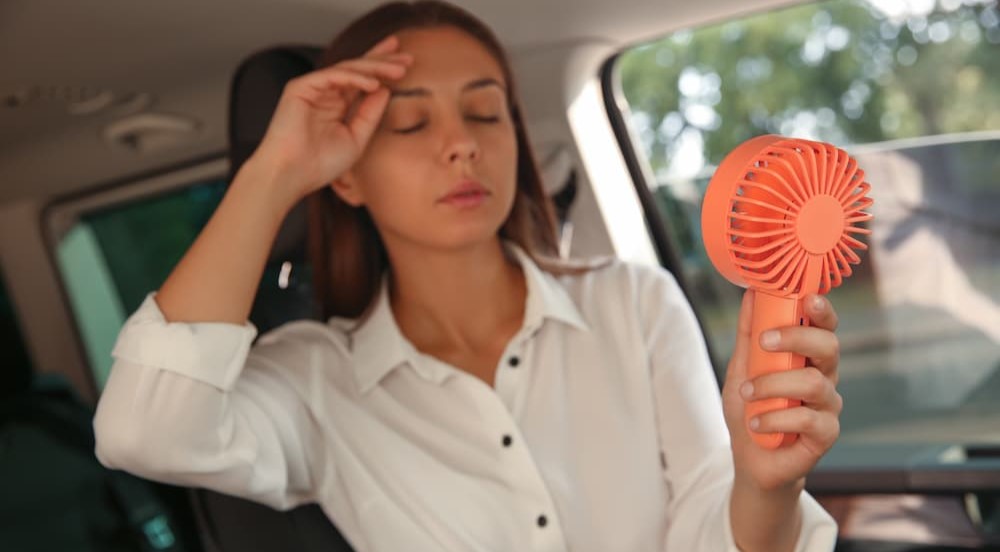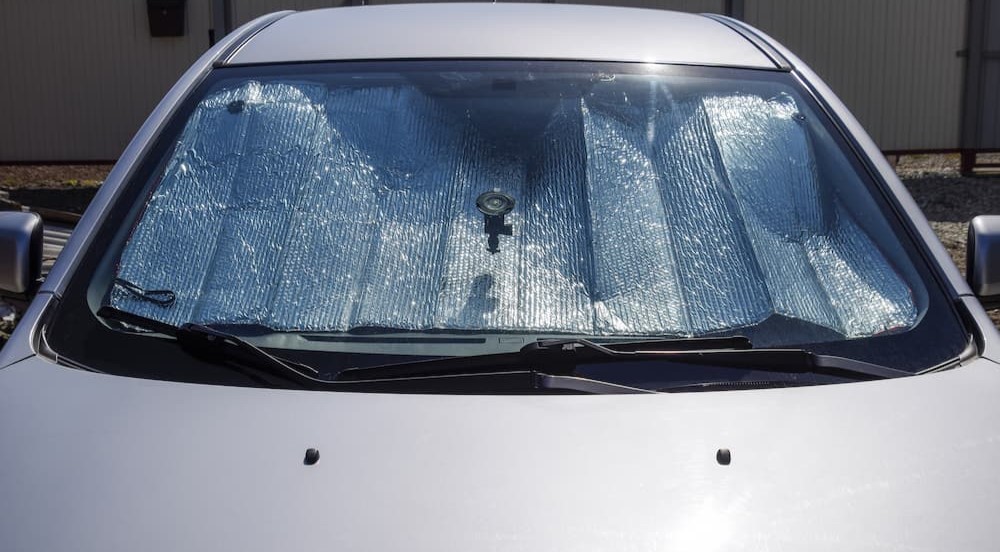Nothing can ruin a nice summer ride faster than feeling like you’re cruising around town in a mobile sauna. A good air conditioning system is a vital part of modern automotive design. As of 2022, it now comes standard on every model for sale in the U.S. market. (That might seem like a surprisingly recent date, but it makes a little more sense when you learn that the lone holdout was an open-air favorite, the Jeep Wrangler.) While A/C is now ubiquitous, it’s not always up to the task, especially for drivers living in warmer climates where broiling sun, high humidity, and triple-digit temperatures are the norm. What should a driver do when the A/C just won’t cut it?
The first step is to look into an A/C recharge. While your car’s A/C is theoretically a closed system, small leaks can cause coolant loss over time. A professional A/C recharge can be had for around $200 and $500 depending on the make and model, though DIY kits can also be found for as little as $30 to $50. When an A/C recharge isn’t enough to cool off the cabin, it’s time to turn to some aftermarket accessories. Plenty of products on the market are designed to help beat the heat, from fan and cooling seats to sun shades and even umbrellas. Read on as we dive into some of our favorites and take a moment to appreciate just how far car cooling technology has come in the last 100 years.
Birth of the Cool
As long as there have been cars, there have been products designed to keep them cool. These extended back to the earliest days of the automobile when drivers would affix large umbrellas to their roofless rides to provide a little shade. That was followed by the electric Knapp Limo-Sedan Fan in 1921 and the Thermador Car Cooler in 1930. The Car Cooler, which looked a little bit like a small jet engine affixed to the passenger’s side window, sucked in air and, powered by a little bit of water, used evaporation to provide a little relief on warm days. Packard designed the first optional air conditioning system in 1939, but the trunk-mounted system was a little too bulky to gain a following, not to mention that it cost more than $6,000 in today’s money. Pontiac and Nash would bring A/C technology into the mainstream in 1940, designing a joint heating and A/C that set a new gold standard in the industry.
Cadillac improved on the dual-purpose heater and A/C approach in 1964 when it introduced Comfort Control. Instead of forcing drivers to manually adjust the heat or A/C to achieve a desired temperature, Comfort Control allowed them to set a target temperature that would be automatically achieved and maintained in an approach similar to many of the systems used today. A/C systems remained the purview of the luxury market for much of the 1960s, with Cadillac, AMC, and Lincoln cornering the market for much of the early part of the decade. That would change as the decade rolled on. By 1969, more than half of new American cars were sold with A/C, though often as an option rather than a standard feature.
Aside from heated and cooled seats and steering wheels, there hasn’t been much development in the A/C sphere over the last 40 years. Another exception would be the changing standards around the refrigerants used in the systems. While R-12 refrigerant was once the most common option, it was largely abandoned due to fears around ozone layer depletion as part of the 1987 Montreal Protocol. R-134a became the new standard, but the refrigerant has since been replaced by R-1234yf, which is more energy-efficient despite looking like a randomly generated password.

The Frigid Five
Returning to the present day, here are five modern marvels to help you stay cool and beat the heat.
Doingart Cooling Car-Seat Cushion
$62, Amazon
While heated seats have been offered for some time, cooling car seats are one of the newest comfort features to hit the auto industry. The only problem is that these tend to be limited to luxury models or offered as a relatively pricey add-on that can top $1,000. If a cool $60 sounds more like your price range, cruise over to the internet’s favorite (or at least largest) retailer and pick up a Doingart Cooling Car-Seat Cushion. The Cooling Car-Seat Cushion is powered by the 12-volt accessory port found on almost every vehicle. It uses three embedded fans to help circulate a little air around your back and rear end. Designed with a polyurethane-based leather substitute and breathable microfiber cloth, an anti-slip rubber back, and secured using two adjustable straps, the Cooling Car-Seat Cushion is fairly unobtrusive and can be set to three different power levels depending on how sweaty things get. The cushion also helps prevent the fading and cracking that can come with direct sun exposure, a nice little bonus that should help improve appearance and resale value.
If you prefer a more affordable, low-tech approach, there are non-powered cooling cushions like the Suninbox Car Seat Pad. Priced at just $20, this seat pad uses buckwheat hulls to help air circulate beneath your behind. The eco-friendly option might be a little more analog than the Doingart Cooling Car-Seat Cushion, but it does earn points for being water-resistant and coming in a variety of colors that will match almost any interior.
Mommy’s Helper Car Seat Cover
$15, Amazon
There’s nothing worse than sliding into a car and feeling like you’ve subjected your thighs to a superheated skillet. Car upholstery, especially leather, can heat up quickly on a warm summer day, making even the shortest ride seem like a dreadful prospect. While most adults can suffer through the first few moments of discomfort, asking a baby or toddler to do the same can feel more than a little cruel, not to mention resulting in some ear-piercing screams. That’s where the Mommy’s Helper Car Seat Cover comes in. This shade cover can be stretched over most standard car seats, reflecting the sun’s rays so effectively that the company says it can keep the baby’s throne up to 26 degrees cooler than the surrounding seats. The elastic car seat cover is easy to whip on and off and easily stored in the driver’s seat rear pocket, storage cubby, or any other small area. While plenty of similar products are on the market, the Mommy’s Helper is one of the best, with a 4.5 rating based on almost 5,500 reviews.
EcoNour Car Windshield Sun Shade
$17 to $40, Amazon
Windshield sun shades have been around forever, and for good reason. They simply work. When parked in the sun, the interior of an enclosed car, truck, or SUV can rise in temperature by 20 degrees in just ten minutes and as much as 43 degrees over the course of an hour. Sun shields help to combat these rising temps by reflecting the sun right back where it came from while providing UV protection for your interior and keeping the dashboard, seats, steering wheel, and buckles from absorbing heat. There is no shortage of sun shades on the market, but the EcoNour gets our pick thanks to its mix of affordability and quality. Made from 240T polyester and easily collapsible, the EcoNour Car Windshield Sun Shade is lightweight and a cinch to install. EcoNour makes sun shades for a variety of vehicles, from small sports coupes and compacts to full-size RVs, so make sure you pick the right size before you hit the checkout.

XOOL Rear Seat Cooling Fans
$29, Amazon
Premium features like cooled and ventilated seats tend to be reserved for front-seat passengers, but the XOOL Rear Seat Cooling Fans are here to bring that same level of comfort to backseat riders. Powered by the 12-volt accessory port, the dual fans can be mounted directly to the front headrests and angled to hit backseat passengers square in the sweaty forehead. The fans can be adjusted using a dial and rotate to help circulate air and provide a wider area of relief. They even come with adhesive clips that’ll make it easy to snake the 5.8-foot cord to your power source.
We wanted to recommend one of the window-mounted solar-powered fans we’ve seen pop up in various internet and social media ads. However, the poor reviews, copycat products, and suspiciously generic names led us to hold off for now. These products would be great for keeping air circulating while you’re away from your vehicle. While we’re sure somebody will eventually develop a reputable version, current offerings are definitely in the “buyer beware” category.
The Noggle
$70, Amazon
While they say there is nothing new under the sun, the Noggle is here to challenge that old aphorism. The Noggle largely serves the same purpose as the XOOL Rear Seat Cooling Fans, allowing backseat passengers to enjoy the same comfort as front-row riders. The product is basically a lightweight, flexible hose that clips onto the A/C vents in the front row and funnels air to a vehicle’s further reaches. The Noggle can be installed in as little as 30 seconds and comes in three sizes — 6, 8, and 10 feet — to accommodate all vehicle sizes. An attachable loop allows the outlet to be affixed to the headrest, car seat, or wherever you need a little relief. Many of today’s vehicles come with their own backseat A/C and heat vents, but if you’re driving an older model or didn’t spring for the extra vents, the $70 Noggle is an affordable solution.
Stay Cool
Windshield-mounted sun shades, fans, and cooling seats can provide some much-needed relief on a sweltering summer day, but they’re not the only way to keep cool. Some of the best methods to beat the heat aren’t products. They’re simple habits. If you dread climbing into a hot car, try parking in your garage, a public parking garage, or under a nice shady tree. A little window tint can also go a long way when it comes to cooling, though it’s important to check your local laws to see what degree of tint is acceptable. Cracking a window to allow a little air to circulate can also be helpful but can raise some issues around security. Following these tips or investing in some of the products listed above can help take a little burden off your overworked A/C when the mercury rises.

